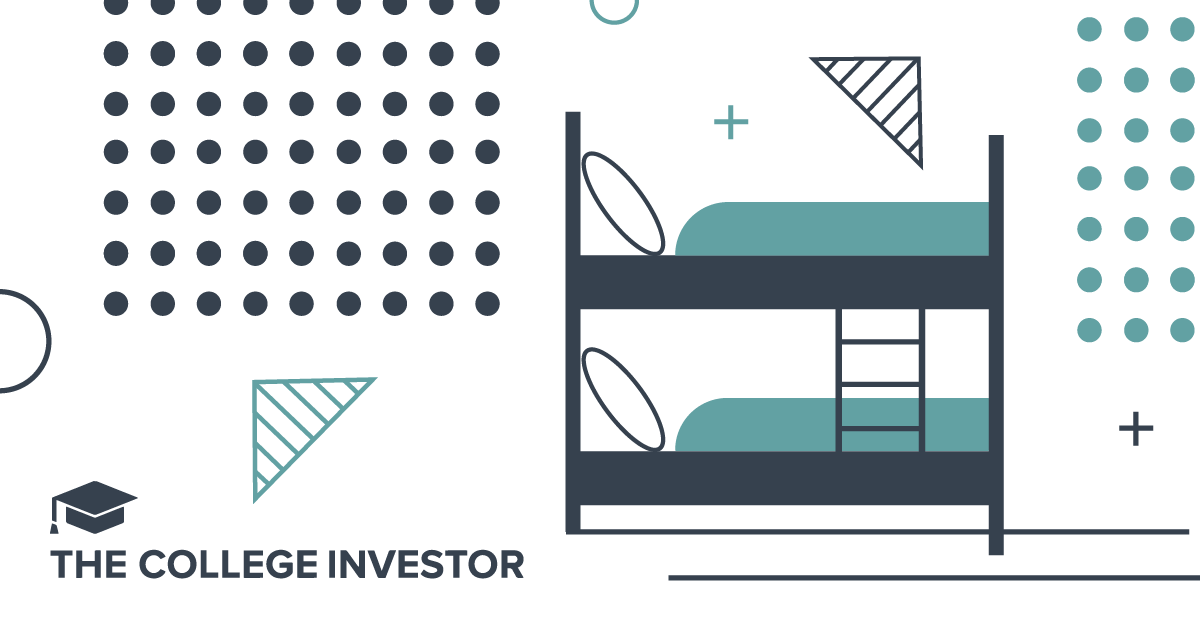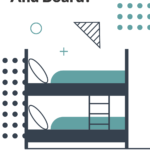
Source: The College Investor
Room and board refers to your living expenses while at college.
Applying to college is only half the battle. Once you get accepted you’ll have to figure out how you’re going to pay for it.
One of the biggest expenses to consider when determining where to go to college is room and board, or the cost of living that’s associated with going to school.
While living expenses can vary, they can substantially increase your overall cost of going to school. In fact, room and board expenses can be 2x or 3x the cost of your tuition!
Here’s what you need to know about room and board and some ways you can get creative to manage your living costs.
What Is Room And Board?
Room and board refers to your primary living expenses when you go away to school. It’s the cost of housing and meals when you live in campus housing.
Room refers to the physical space you live in the related costs. This can be a dormitory or an on-campus apartment. Room expenses include utilities like electricity, internet, and water.
Board includes meals you can redeem at a campus-run dining hall as well as “dollars” you can spend at cafes on campus. This too can vary based on the type of meal plan you get.
Some schools have an on-campus housing requirement for first- and second-year students. Because room and board is typically not included in tuition, this can drastically increase your cost of attendance.
How Much Does Room and Board Cost?
There are a number of factors that affect the cost of room and board. Rural campuses, for example, are less expensive than attending college in a major city. A single dorm room will likely cost more than living in a shared dorm. Even extra amenities such as air conditioning or parking can also increase your final housing bill.
According to the Education Data Initiative, the average cost of room and board is $12,917. Private colleges tend to have a housing requirement and charge more for room and board than in-state public schools. Because many public schools don’t have a housing requirement, it’s easier for students to live off campus and commute to class.
A campus meal plan is a requirement if you live in student housing that doesn’t have a kitchen. This is usually more expensive than cooking at home. The Education Data Initiative also reports that the average meal plan is around $570 per month while cooking at home is around $263.
Meal plans can be purchased for a set number of meals per week and include an allowance to spend at campus-run cafes and convenience stores. Some schools like Cornell University partner with local restaurants, allowing students to spend their meal plan dollars off campus.
Example Of Room And Board Compared To Tuition
Here's an example of how room and board can significantly impact the cost you pay for college. Make sure you understand the requirements of your college when figuring out the cost of attendance.
Let's take San Diego State University as an example. If you're a resident of San Diego, you're not required to live on campus (but you can choose to). However, if you're not a resident of San Diego, or are an out-of-state student, you are required to live on campus for your first year of college.
In-State Tuition: $8,728
Out-Of-State Tuition: $21,328
Cost Of Room And Board On Campus: $23,030
As you can see, the cost of living on campus is expensive!
For a local student, living on-campus takes your total cost of one year of college from $8,728 to $31,758.
If you're out-of-state, it's even more expensive! You will pay at least $44,358 for just tuition, room, and board.
You have to remember that this is also just one year. Prices usually rise each year. And you'll have additional costs like books and supplies, travel, and more. Just run these numbers through our College ROI Calculator and you'll quickly discover it's not worth the price.
Related: Why You Should Never Apply To An Out-Of-State "State" College
Pros and Cons of Room and Board
When considering where to go to school, it’s important to evaluate how room and board will impact your quality of life and total cost of attendance.
Pros
- Convenient to classes and campus resources
- Opportunity to socialize with other students
- Secure access
- Ability to learn important skills without being completely on your own
Cons
- On-campus housing and meals tend to be more expensive
- Lack of privacy
- Must adhere to campus rules
- Unable to establish credit history with utility companies
How to Pay for Room and Board
Before you sit down to create a budget, evaluate the cost of living of where you plan to go to school. While attending a prestigious school in a major city has its advantages, you don’t want to wind up having to live in an overpriced dorm that you have to pay for years after you graduate.
After you budget for the total cost of attendance – including room and board – you’ll need to figure out how to pay for it. Student loans will cover housing. If you live on campus, room and board will be billed directly to your Bursar account and you won’t have to worry about it. If you live off campus, you can use any refund you get to help you pay rent and other housing costs.
One thing to keep in mind is that even if you use a loan to cover your living expenses, it will still accrue interest. While the all-you-can-eat buffet in your dining hall may seem fun your freshman year, it will cost a pretty penny thanks to compound interest.
Figure out what type of housing is available and what your personal preferences are. When I was a student I had a housing requirement but could opt to live in a campus apartment my sophomore year instead of a dorm. The apartment cost the same as a dorm and had a full kitchen, allowing me to opt out of a pricey meal plan.
Grants and scholarships can also be used to cover room and board. This is essentially free money that you won’t have to pay back. Make sure to read the fine print of any award money you receive to make sure there are no special stipulations on how you spend it.
You can also get free or reduced housing by becoming a resident advisor or RA. You’ll usually be responsible for managing undergrads in an on-campus dorm but doing so will give access to a single dorm and a meal plan. This can be a great option to dramatically cut your living expenses.
The bottom line? As you evaluate your college options, don’t skip room and board. This can be a significant cost regardless of where you live and can add to your overall education costs.

Amanda Claypool is a writer, entrepreneur, and strategy consultant. She’s lived in the Middle East, Washington, DC, and a 2014 Subaru Outback but now calls Asheville home. Amanda writes about money, crypto, emerging tech, and the future of the economy on Medium.
Editor: Colin Graves Reviewed by: Robert Farrington
